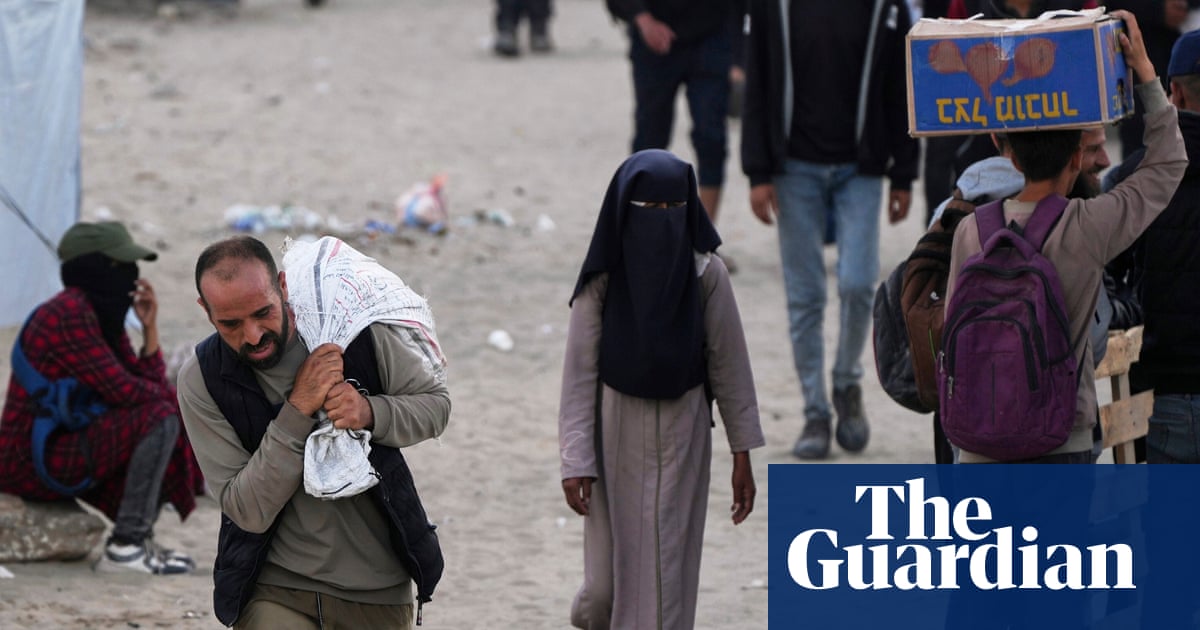Israel’s military has warned residents of Gaza against travel in areas leading to aid distribution centres, after at least 27 Palestinians were killed by Israeli fire as they waited for food at the points set up by the US-backed foundation.
An Israeli military spokesperson on Tuesday said roads leading to the distribution centres set up by theGazaHumanitarian Foundation (GHF) were considered “combat zones”.
In a post on social media, the GHF announced that its distribution points would be closed on Wednesday for “update, organisation and efficiency improvement work”. The group did not give more information on the improvements it intended to make. Operations would resume on Thursday, the group claimed.
The organisation said it was in discussion with the Israeli military to boost security measures beyond the immediate perimeter of GHF sites.
Gaza’s health ministry said27 people were killed early on Tuesdayas they gathered to received food at one of the GHF’s food distribution hubs. It was the third such incident in three days, with Israel admitting on Tuesday for the first time that its forces shot at Palestinians who were moving towards them.
In a statement, the Israel Defense Forces (IDF) said troops fired shots near a food distribution complex after noticing “a number of suspects moving towards them”.
“The forces fired evasive shots, and after they did not move away, additional shots were fired near the individual suspects who were advancing towards the forces.
“The individuals were moving towards forces in a way that posed a threat to them,” the military said, without specifying who the suspects were.
A spokesperson for the Gaza Humanitarian Foundation (GHF), which has taken over the distribution of food in Gaza and is backed by Israel, told the Associated Press the group ‘‘was saddened to learn that a number of civilians were injured and killed after moving beyond the designated safe corridor”.
The incident ocurred as the same site where on Sunday more than30 Palestinians were killed by Israeli firewhile they were heading to the distribution hub.
The United Nations’ human rights chief, Volker Türk, described the “deadly attacks” on civilians around food distribution as a war crime.
“Deadly attacks on distraught civilians trying to access the paltry amounts of food aid inGazaare unconscionable,” Türk said. “Attacks directed against civilians constitute a grave breach of international law and a war crime.”
Witnesses told the Guardian the shooting started in the city’s Flag Roundabout area, about 1km (0.6 miles) away from the food distribution hub.
Fadi Abu Mohammad, 43, said his relative Mohammad Abu Shamala, 22, was killed near the aid site.
‘‘When gunfire opened on the civilians, he was struck by a bullet in the back and died instantly,’’ he said. ‘‘He was supposed to get married next month.’’
‘‘Going back to the aid distribution is a huge risk and a potential death sentence, but everyone who went had no other choice. If they aren’t killed by bullets or shelling, they will die of hunger,’’ said Fadi.
Israelimposed a blockade on all suppliesin March, claiming Hamas was seizing deliveries for its fighters. The group denies this and aid officials in Gazahave said there was no evidenceof any widespread diversion of aid at any stage of the conflict. Earlier this month, a global hunger monitor said half a million people in the strip faced starvation.
The GHF took over the handling of aid despite objections from the UN and other humanitarian organisations, who criticised the new system for food distribution, saying it would not be able to meet the needs of Gaza’s 2.3 million people, and it allowed Israel to use food as a weapon to control the population.
On Tuesday, an evangelical leader and adviser to Donald Trump on interfaith issues wasappointed the new head of the GHF. Johnnie Moore, a member of the US Commission on International Religious Freedom and founder of the boutique advisory firm Kairos Company, was appointed the new head of the GHF after Jake Wood, a former marine, resigned,saying that he could not guarantee the GHF’s independencefrom Israeli interests.
Moore has been a vocal defender of the GHF who has bristled at public criticism of the rollout, telling the UN chief, António Guterres, on X that reports of Palestinians killed and injured while seeking aid inGazawas “a lie … spread by terrorists”.
With Reuters
